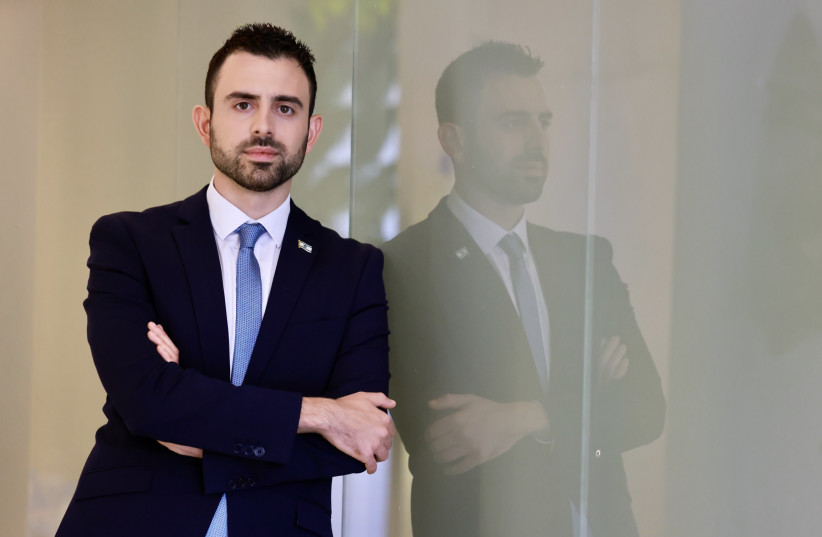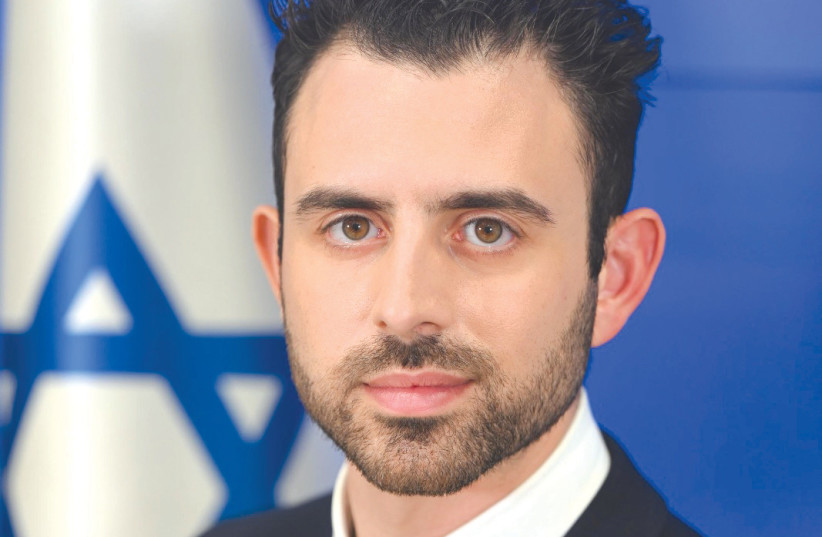A special forces hasbara unit: Eylon Levy’s strategy for turning the narrative war for Israel
Before he became a government spokesman, Eylon Levy participated in anti-government demonstrations. As a government spokesman, he became a media star because the combination of his quick mind, glib tongue, and expressive eyebrows appealed to English-speaking people around the world.
But then his past political activity came to haunt him, and as good a job as he was doing for Israel, it wasn’t sufficiently impressive in some circles for his past to be ignored.
Of course, it would have been more to Israel’s advantage if the people who dismissed him had demonstrated greater faith in the national slogan, ‘Together we will win.’
But Levy is not the least bit bitter because he can now be completely honest. Not that he wasn’t honest before – at least in matters that he believes to be true, but Israeli journalists frequently have to report on issues and incidents about which they have doubts – and it’s beginning to irk them. Only a few days ago, KAN 11’s political and diplomatic reporter Gili Cohen, in an angry monologue, declared that it was time to tell the truth.
Finding balance
A major problem that has confronted Israeli journalists for 75 years is finding a happy medium between patriotism and professionalism.

If Israel did not face an existential threat on many fronts, Israeli journalists could afford to be less circumspect.
But when national security is at stake, they have to censor themselves and repeat material contained in government press releases in which there are sins of either omission or commission.
Levy did not stay idle following his dismissal. He’s busy interviewing and broadcasting on his podcast State of a Nation, which is a mix of politics, news, and rebuttals of lies told about Israel by antisemites and ignoramuses.
But Levy isn’t content with just what he’s doing on the podcast; in his view, that is simply not enough.
He’s gone a step further and launched the Israel Citizen’s Spokespersons’ Office, a voluntary team of well-informed ordinary citizens (mostly immigrants) who speak in their native languages and advocate for Israel and the Jewish People.
“You don’t have to be an official spokesperson to speak up for Israel,” he says. “The Jewish People and Israel are under attack all around the world.” To counter this situation, Levy is building a team of citizen spokespeople to share the facts, truth, and messages needed to fight against the lies that are being disseminated.
Daily updates are provided Sunday through Thursday on all social media platforms at 3 p.m. Israel Time, 8 a.m. Eastern Time.
But now, he envisages an even broader horizon. He shared his views this week at the annual B’nai B’rith World Center Awards ceremony for Excellence in Diaspora Reportage.
As the keynote speaker at the event held at the Begin Heritage Center in Jerusalem, Levy began his address by speaking about Benjamin Metudela, whom he described as the first reporter on Jewish diaspora affairs. During the 12th century, Benjamin traveled all over Europe, Asia, and Africa, looking for Jewish communities large and small and writing about them in Hebrew.
The writings from his travels present a comprehensive picture of vibrant Jewish life, which was not always a story of suffering and persecution.
Benjamin kept the global Jewish nation updated, said Levy, who is eager to revive the interconnection of the scattered communities of a global nation, because there are international forces at work intent on making the Jews powerless, as demonstrated by the decision of the International Court of Justice.
So-called Human Rights organizations are contributors to the war against Israel and the Jews, he asserted. “A world in which Israel has become an international symbol of evil is not safe,” he said, adding that “Israel is losing the information war” but is obligated to fight on.
Quoting Ethics of the Fathers, Levy repeated the words of Rabbi Tarfon, who said: ‘You are not obligated to finish the work. But neither are you free to neglect it…’
“Even if we do not win the (information) war, we are obligated to fight on,” said Levy, underscoring that “Israel is the only country in the world that has to defend itself in the court of public opinion – around the clock.”
Full of praise for the people with whom he worked while serving as a government spokesman, he was less than complimentary about the way that political diplomacy is handled by Israeli government offices, declaring that the Ministry for Foreign Affairs must rethink its model.
“We’re a polyglot nation built by people from almost every country,” he said.
This means that people with language and communication skills, who are able to speak with authority in different languages and time zones, must be used so that when a media outlet anywhere in the world wants to interview an Israeli on any new development, there will always be people who can speak the language of the interviewer and who are familiar with the situation.
People are also needed to fact-check any negative comments made about Israel or the Jewish People and to be able to respond with logic and accuracy to such charges on all social media platforms.

Using military terminology, Levy said: “We need a special forces unit.”
He also suggested that recruits for such a unit be taken from among high school students who can think logically and argue credibly and can be part of a crisis communications war room.
For this to work, it means studying every word uttered about Israel and the Jewish People, being active, and thinking ahead.
Only by establishing a global network can the battle be won, he opined. Such a network must include Jews who live in Zion and those who live beyond to build a shared partnership of destiny and purpose so that the world will see “what we Jews are capable of doing when we join forces.”
The connection should start early, with every school in Israel twinning with a Jewish school in the Diaspora, Levy suggested.
Moving back into the adult sphere, Levy insisted that everyone in the government be held to account and barred from the vulgar statements and extremist outbursts that make diaspora Jews recoil.
“It also gives ammunition to the enemy,” he warned, adding that the nation’s leaders must act responsibly and respectfully.





Comments are closed.